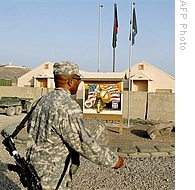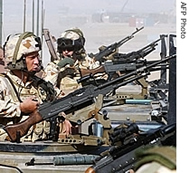-
(单词翻译:双击或拖选)
 |
| US General David Petraeus speaks to the media in London, 29 Sep 2008 |
It is not difficult to find praise for General David Petraeus' year-and-a-half in Iraq, during which violence dropped 80 percent and U.S. troops began to hand over responsibility to the new Iraqi forces in large parts of the country.
This is how retired1 General Gordon Sullivan introduced Petraeus at a conference of soldiers, veterans and their supporters in Washington earlier this month.
He said, "You have a very unique opportunity today to listen to this great soldier, scholar, commander, thinker, athlete and leader of troops, a great American and a great American soldier, General David Petraeus."
Such praise appears to slightly embarrass General Petraeus, who is always quick to say he shares any credit with U.S., coalition2, and Iraqi troops.
But these days, more than a month after he left Iraq, attention is shifting to what Petraeus will do in his new job, and particularly whether he will be able to apply the counterinsurgency doctrine4 he published and then used in Iraq to the increasingly tough fight against the Taliban, al-Qaida and associated groups in Afghanistan.
In a VOA interview, Petraeus said the Afghanistan war is a very different fight, but he also said some of what he did in Iraq will apply there.
"There are certain concepts, obviously, that apply to many contingencies5 - certainly the need to focus on the security of the population, to try where possible, and in the case of Afghanistan, clearly, with President Karzai's support, to pursue reconciliation6 where that's sensible, where it won't collide with warlordism and so forth7," he said.
The general's call for talks with what he calls "reconcilable" elements of the insurgency3, potentially including some Taliban elements, was endorsed8 by his boss, Defense9 Secretary Robert Gates.
General Petraeus listed a dozen other keys to counterinsurgency, including securing and living among the local people, coordinating10 with civilian11 agencies from many countries and with aid groups, pursuing irreconcilable12 enemy leaders and fighters, and training local forces to prepare for a transition of responsibility.
The general will start his command with a thorough review of the U.S. strategy in Afghanistan. The Pentagon and the White House are also conducting reviews. All that will be available for the new president to evaluate and make decisions on when he takes office in January.
But General Petraeus told VOA the mission in Afghanistan will require more U.S. troops, just like he got in the famous "surge" in Iraq.
"There is no question but that Afghanistan needs additional forces. Everyone agrees with that," he said. "I am among them. The secretary of defense, chairman of the Joint13 Chiefs, NATO secretary general, NATO leaders, and so forth, all very much agree on that score. Precisely14 how many, what configuration15 and so forth is what will be sorted out over the course of the months ahead."
 |
| A US soldier walks through compound at Forward Operating Base Salerno on outskirts16 of Khost, Afghanistan (file) |
Officials said the U.S. troop increase in Afghanistan could reach 20,000 or more during the coming year, in addition to the 20,000-troop increase by the United States and NATO allies during the past year. But the United States can only do that if security conditions enable it to reduce the troop level in Iraq by about the same number.
The first additional brigade of about 4,000 U.S. troops is expected to be in Afghanistan by January. The U.S. and NATO commander in Afghanistan, General David McKiernan, says he needs a sustained increase, not just a temporary surge.
Retired U.S. Army lieutenant17 colonel and counterinsurgency expert John Nagle said General Petraeus' experience will serve him well in his new job as U.S. Central Command leader.
"The principles of counterinsurgency that General Petraeus employed so effectively in Iraq in fact have much to teach us about a better approach to the war in Afghanistan," he said. "Perhaps the most important of those lessons is the absolute necessity to create security on the ground. And the only way to do that in a lasting18 way is to put ground troops in."
But some experts warned that sending too many U.S. troops could create more opposition19. They urge a more Afghan-based approach, supported by foreign aid.
Professor Andrew Bacevich at Boston University predicted that General Petraeus will not be able to apply the formula that led to success in Iraq to create a successful strategy for Afghanistan.
"I doubt it. The two theaters of war are radically20 different in terms of geopolitical setting, in terms of their history, culture, the makeup21 of the population," he said. "So to imagine that if there is a cookie-cutter recipe that it can be applied22 to Afghanistan I think is probably too optimistic."
Another defense analyst23, Michael O'Hanlon of the Brookings Institution in Washington, was also skeptical24 of any effort to directly apply tactics that worked in Iraq to Afghanistan.
"Afghanistan is actually in some ways a harder problem at this point, and not totally analogous25 to what Iraq had been two years ago," he said. "I do think it's actually a situation that's going to require some fresh new ideas."
 |
| Australian soldiers of NATO-led International Security Assistance Force (ISAF) keep guard on top of armored vehicles, in Tirin Kot, capital of Uruzgan province (File) |
General Petraeus acknowledges things have not gone well in Afghanistan in recent months, and he recognizes the country and the conflict are very different from Iraq. In addition, many players have a voice in how the Afghanistan war is conducted, including NATO countries and the Afghan government. There is also the added complexity26 of insurgents28 who have bases in Pakistan, and the increase in violence they have been able to generate.
He said, "In some respects, there has been a downward spiral in some areas. The trends have gone in the wrong direction. So in certain areas you clearly have to arrest those trends, reverse them, and then begin moving forward."
Afghanistan is the main challenge General Petraeus will face in his new command, but not the only one. Among the many other concerns in his region, he will also have to support the continuing U.S. effort in Iraq, manage security in the Persian Gulf29, worry about the potential for conflict with Iran and work with Pakistani leaders to help address the insurgent27 safe havens30 along the Afghan border. Iraq was a difficult problem. Petraeus' new job is exponentially more complex.
 收听单词发音
收听单词发音
1
retired

|
|
| adj.隐退的,退休的,退役的 | |
参考例句: |
|
|
|
2
coalition

|
|
| n.结合体,同盟,结合,联合 | |
参考例句: |
|
|
|
3
insurgency

|
|
| n.起义;暴动;叛变 | |
参考例句: |
|
|
|
4
doctrine

|
|
| n.教义;主义;学说 | |
参考例句: |
|
|
|
5
contingencies

|
|
| n.偶然发生的事故,意外事故( contingency的名词复数 );以备万一 | |
参考例句: |
|
|
|
6
reconciliation

|
|
| n.和解,和谐,一致 | |
参考例句: |
|
|
|
7
forth

|
|
| adv.向前;向外,往外 | |
参考例句: |
|
|
|
8
endorsed

|
|
| vt.& vi.endorse的过去式或过去分词形式v.赞同( endorse的过去式和过去分词 );在(尤指支票的)背面签字;在(文件的)背面写评论;在广告上说本人使用并赞同某产品 | |
参考例句: |
|
|
|
9
defense

|
|
| n.防御,保卫;[pl.]防务工事;辩护,答辩 | |
参考例句: |
|
|
|
10
coordinating

|
|
| v.使协调,使调和( coordinate的现在分词 );协调;协同;成为同等 | |
参考例句: |
|
|
|
11
civilian

|
|
| adj.平民的,民用的,民众的 | |
参考例句: |
|
|
|
12
irreconcilable

|
|
| adj.(指人)难和解的,势不两立的 | |
参考例句: |
|
|
|
13
joint

|
|
| adj.联合的,共同的;n.关节,接合处;v.连接,贴合 | |
参考例句: |
|
|
|
14
precisely

|
|
| adv.恰好,正好,精确地,细致地 | |
参考例句: |
|
|
|
15
configuration

|
|
| n.结构,布局,形态,(计算机)配置 | |
参考例句: |
|
|
|
16
outskirts

|
|
| n.郊外,郊区 | |
参考例句: |
|
|
|
17
lieutenant

|
|
| n.陆军中尉,海军上尉;代理官员,副职官员 | |
参考例句: |
|
|
|
18
lasting

|
|
| adj.永久的,永恒的;vbl.持续,维持 | |
参考例句: |
|
|
|
19
opposition

|
|
| n.反对,敌对 | |
参考例句: |
|
|
|
20
radically

|
|
| ad.根本地,本质地 | |
参考例句: |
|
|
|
21
makeup

|
|
| n.组织;性格;化装品 | |
参考例句: |
|
|
|
22
applied

|
|
| adj.应用的;v.应用,适用 | |
参考例句: |
|
|
|
23
analyst

|
|
| n.分析家,化验员;心理分析学家 | |
参考例句: |
|
|
|
24
skeptical

|
|
| adj.怀疑的,多疑的 | |
参考例句: |
|
|
|
25
analogous

|
|
| adj.相似的;类似的 | |
参考例句: |
|
|
|
26
complexity

|
|
| n.复杂(性),复杂的事物 | |
参考例句: |
|
|
|
27
insurgent

|
|
| adj.叛乱的,起事的;n.叛乱分子 | |
参考例句: |
|
|
|
28
insurgents

|
|
| n.起义,暴动,造反( insurgent的名词复数 ) | |
参考例句: |
|
|
|
29
gulf

|
|
| n.海湾;深渊,鸿沟;分歧,隔阂 | |
参考例句: |
|
|
|
30
havens

|
|
| n.港口,安全地方( haven的名词复数 )v.港口,安全地方( haven的第三人称单数 ) | |
参考例句: |
|
|
|















